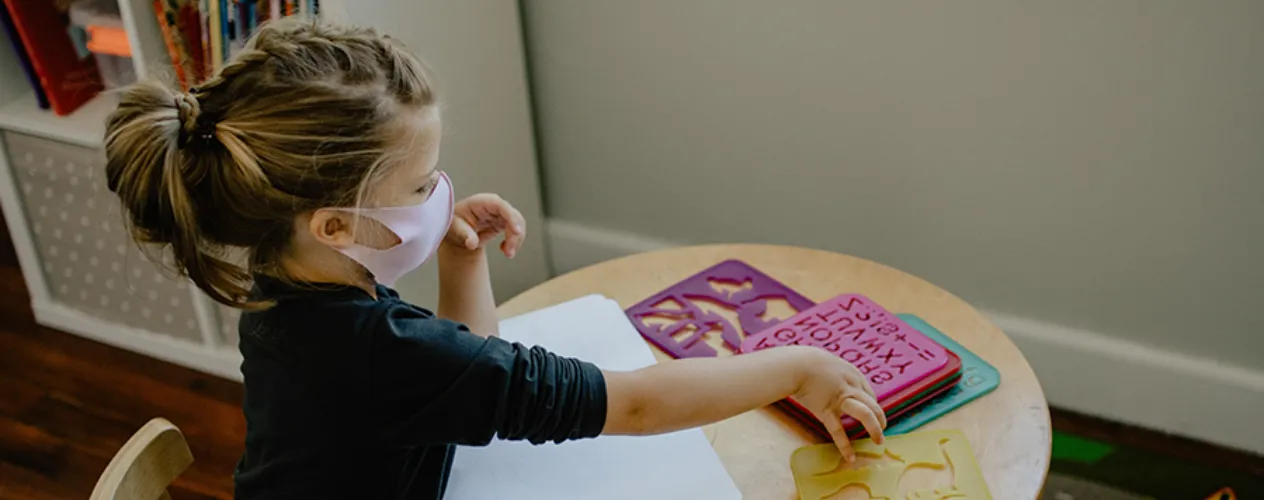Schooling disrupted by the pandemic in the united states likely to have life-long impact, study says
Team that includes UCLA FSPH researchers suggests loss of 2-4 months of education in grade school could lead to shortened life spans.

A team that includes UCLA Fielding School of Public Health researchers has found American children whose educations have been disrupted by the pandemic, even as little as 2-4 months, may face shortened life spans.
“During the COVID-19 pandemic, the United States has extracted an enormous sacrifice from its youngest citizens to protect the health of its oldest,” said Frederick Zimmerman, UCLA Fielding School of Public health professor of health policy and management. “During a pandemic, this may well be an ethically defensible tradeoff, but only if resources are invested to reverse the potential damage to health and education inflicted on a population with low visibility and high vulnerability.”
The research, “Estimation of US Children’s Educational Attainment and Years of Life Lost Associated With Primary School Closures During the Coronavirus Disease 2019 Pandemic,” is published in the November edition of the JAMA Network Open, a peer-reviewed journal published by the American Medical Association, under the aegis of the Journal of the American Medical Association (JAMA). The team, made up of Zimmerman and researchers from the University of Washington, includes co-author Dr. Dimitri A. Christakis, with the Seattle Children’s Research Institute.
“Although the risks of keeping schools open drove decisions made in the early phases of the pandemic, the probable harm to children associated with school closure were less explicitly discussed,” Christakis said. “The public debate has pitted ‘school closures’ against ‘lives saved,’ or the education of children against the health of the community. Presenting the tradeoffs in this way obscures the very real health consequences of interrupted education.”
Researchers created an analytical model that estimated the association between school closures and reduced educational attainment and the association between reduced educational attainment and life expectancy using publicly available data sources, including data for 2020 from the U.S. Centers for Disease Control and Prevention, the U.S. Social Security Administration, and the U.S. Census Bureau. Direct COVID-19 mortality and potential increases in mortality that might have resulted if school opening led to increased transmission of COVID-19 were also estimated.
A total of 24.2 million children aged 5 to 11 years attended American public schools that were closed during the 2020 pandemic, losing roughly 54 days of instruction. Previous estimates suggest that this loss of schooling will shorten total educational attainment, by an average of about four months for boys, and almost three months for girls, researchers said.
“Other social scientists have already shown that students who are deprived of educational opportunities live shorter lives,” Zimmerman said. “And they've worked hard to isolate the causal effects of reduced years of schooling on life expectancy by statistically controlling for other factors. So we have a pretty good idea of how shortening a child's educational career shortens his or her life overall.”
Extrapolating further, the missed instruction may be associated with an estimated 5.53 million potential years of life lost (YLL). The Centers for Disease Control and Prevention reported a total of 88,241 US deaths from COVID-19 through the end of May 2020, with an estimated 1.5 million YLL as a result.
Had schools remained open, 1.47 million additional YLL could have been expected as a result, based on results of studies associating school closure with decreased pandemic spread. Comparing the full distributions of estimated YLL under both “schools open” and “schools closed” conditions, the analysis observed a 98.1% probability that school opening would have been associated with a lower total YLL than school closure.
Zimmerman cautioned that the models – based on studies of the effects of school closures in Argentina, Belgium, and Pakistan - are just that, of course, and crisis managers in a pandemic are always going to be cautious about exposing children to a potentially deadly infection.
“If the choice is just between keeping schools open or closing them in the face of this unprecedented upsurge in COVID19 cases, I would favor closing them,” he said. “But that isn't the only choice.”
Other possible courses of action could include heavy investment in protective equipment for schools, as other countries have done to keep schools open. This would mean personal protective equipment like masks, but also buying plexiglass dividers and hand sanitizing stations for classrooms, spacing children out in classrooms, adding better air filtration equipment for structures and heating equipment for outdoor learning. These efforts, along with regular testing of all children and staff and contact-tracing for anyone infected, could have allowed schools to remain safely open, at least in a limited capacity.
“In Britain the schools have been open but the pubs have been closed,” Zimmerman said. “In the United States the schools are closed and the bars are open. That says a lot about whom our politicians value.”
Citation:
Christakis DA, Van Cleve W, Zimmerman FJ. Estimation of US Children’s Educational Attainment and Years of Life Lost Associated With Primary School Closures During the Coronavirus Disease 2019 Pandemic. JAMA Netw Open. 2020;3(11):e2028786. doi:10.1001/jamanetworkopen.2020.28786
The UCLA Fielding School of Public Health, founded in 1961, is dedicated to enhancing the public's health by conducting innovative research, training future leaders and health professionals from diverse backgrounds, translating research into policy and practice, and serving our local communities and the communities of the nation and the world. The school has 631 students from 26 nations engaged in carrying out the vision of building healthy futures in greater Los Angeles, California, the nation and the world.
Faculty Referenced by this Article

Professor of Community Health Sciences & Health Policy and Management, and Associate Dean for Research


